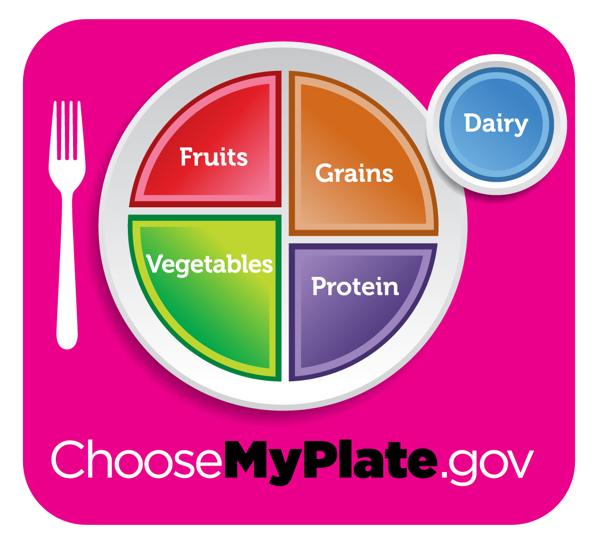St. Luke's Health joins CommonSpirit.org soon! Enjoy a seamless, patient-centered digital experience. Learn more

While there is no one nutritional diet that works for everyone, there are recommended nutritional elements for the general population. Depending on your age and medical conditions, your dietary plan may need adjustments. Talk with your doctor to find a personalized nutrition plan that would work best for you.
The USDA and the U.S. Department of Health and Human Services recommend following their My Plate guidelines when preparing each meal. The plate is divided into food group sections with varying sizes depending on the amount of each food you should aim to eat. There are five main food groups you need to consume to receive proper nutrition.

Vegetables are chock full of vitamins and minerals and also contain fiber and protein. They give you the nutrients your body craves without the calories and fat of other less healthy choices. Eating plenty of vegetables can help lower your risk for chronic diseases, like diabetes and heart disease.
Experts recommend adults eat 2.5 to 3 cups of veggies daily. Unfortunately, American adults eat less than 1.5 cups a day on average. Need help visualizing a cup of vegetables? A one-cup serving of vegetables is equal to:
It is best to eat a colorful variety of vegetables every day. The distinctive color of each vegetable gives you a clue into what nutrients are in each. Dark leafy greens, like spinach, are full of vitamin A and folic acid. Red vegetables, like red bell pepper, have lots of vitamins C and A.
You don’t have to stick with common veggies like potatoes and lettuce. Expand your palate with butternut squash, cassava, or sugar beets.
Experts recommend eating between 5 and 8 ounces of grain daily, and at least half of those ounces should be whole grain. Whole grains contain the entire grain kernel while refined grains are milled to remove the bran and germ of the kernel. Americans are not getting enough whole grain; only 8% of adults are consuming at least 3 ounces a day, and 40% claim not to eat any whole grain.
One ounce of whole grain is equivalent to:
Whole grains in particular are excellent sources of essential nutrients. They contain magnesium for bone health, selenium for immune system support, and fiber for digestion and weight management.
Check nutrition labels at the grocery store to see if the foods you are purchasing are whole-grain. Remember, products that are labeled “multi-grain” and “whole wheat” do not necessarily mean that they are whole grain.
You should aim to eat 5 to 6.5 ounces of protein every day. This amount may vary based on your level of physical activity.
Protein is not only found in meat; you can get your fill with beans, peas, and nuts, to name a few sources. When deciding on what source of protein to eat, go for lean meats and low-fat options. Choose a variety of protein products to eat each week. It is also recommended to eat at least 8 ounces of cooked seafood a week unless you are vegetarian.
One ounce of protein is equivalent to:
Try our award-winning Black Bean Budino with Fresh Berries and Pomegranate recipe for a healthy twist on dessert with protein and fiber.
Experts recommend eating 1.5 to 2 cups of fruit each day. Only 13% of Americans consume the daily recommended amount of fruit. What’s even worse is 39% of Americans entirely pass up fruit each day.
One cup of fruit is equivalent to:
As with vegetables, it’s important to eat a colorful variety of fruits to get a variety of nutrients. There are many different fruits in the world, and chances are you have yet to try them all. Mix things up with elderberries, guava, and star fruit. Try St. Luke’s Health–The Woodlands Hospital’s heart healthy recipe for a Gourmet Blueberry Blood Orange Smoothie.
Dairy products give you the calcium to support your bone health and strengthen your teeth. Food made from milk that retains its calcium content or is calcium-fortified is part of the dairy food group. Everyone should aim to consume 3 cups of dairy every day. Even if you are lactose intolerant, you can get your fill of dairy through lactose-free dairy products.
One cup of dairy is equivalent to:
When deciding on dairy products, go for fat-free or low-fat items that are high in calcium.
If you need some tips to make it easier to eat healthy, take these Simple Steps to Help You Eat Better. Be sure to also exercise daily to complement your nutritious diet for overall health. Make an appointment with one of the primary care physicians at Baylor St. Luke’s Medical Group The Woodlands to receive a dietary consultation and personalized nutrition plan.
Sources:
Add Variety to Your Vegetables
Wanted: Whole Grains in Your Diet
Looking for a doctor? Perform a quick search by name or browse by specialty.